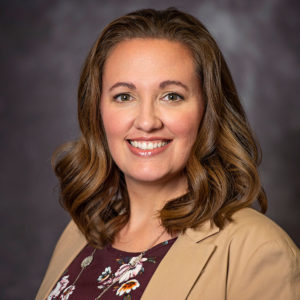MELANIE MITROS
Vitalyst Health Foundation
Director of Strategic Community Partnerships
Phoenix, Arizona
PLACES 2017 Cohort
 Melanie Mitros had an important job when she was 4 years old: helping out in her mother’s research lab, organizing plastic pipettes and caring for the occasional rodent.
Melanie Mitros had an important job when she was 4 years old: helping out in her mother’s research lab, organizing plastic pipettes and caring for the occasional rodent.
Her mom was deep into her doctoral research and the lab was filled with various works- in-progress, including lab rats and mice.
“I felt important because she always made a point for me to find something to do and made me feel that, even though I was a little kid, I had role in helping,” said Mitros, who grew up in a small farm in Greenwood, Alabama, where her family plant- ed and harvested most of the food they ate.
She said those early years in the lab — learning to find pride in purpose and watching her mother follow her passion to tackle difficult but potentially impactful work — built a foundation that roots her still today.
“I am so incredibly thankful for her perseverance and setting that example for me as a kid,” said Mitros, who works with disease-specific groups, coalitions and community boards as part of her work at the Vitalyst Health Foundation. “These experiences made me feel I could do whatever I wanted.”
Why did you get into philanthropy?
I had an opportunity to become the founding executive director for a nonprofit in Phoenix, Arizona. While I quickly realized college inadequately prepared me for this role, I was fortunate to have a mentor in the program officer overseeing the first grant I received.
This mentorship led me directly to the role I hold now. I continue to be intrigued by the intellectual freedom that comes from working in philanthropy.
You were a PLACES fellow. What was that experience like and how has it impacted your work?
Looking back, I realize that I initially lacked the skills to navigate the transition between my internal fire which was set ablaze in PLACES to shifting our organization.
It was difficult starting to unpack my own biases around race and history and segregation and injustices. The history I learned in school was so sanitized. I remember as a PLACES fellow really learning and talking about the history of red-lining, and how veteran benefits that were not extended to veterans of color.
How many other things had I learned in school that weren’t really what happened? A lot of questions percolated from what I learned in PLACES.
I oversee our grantmaking at Vitalyst, so I automatically started shifting our grantmaking process to be more equitable.
What is one of the biggest challenges you’re facing right now in this work?
It’s not protecting time and space to be thoughtful in how we do work and how we engage with other people — as an individual, as an organization, as a nonprofit culture. It’s something I’ve really been scratching my head about. How do I change my behavior to take the time to get to know the person in front of me before we dive into whatever work we came together to do?
It’s a constant push back against the dominant culture of engaging transactionally — get the meeting done and go to the next thing.
If you could write a very short letter —“Dear People In Philanthropy…” What would it say?
Dear People in Philanthropy,
Do you know where the money for your philanthropy came from? And what are you doing to help or support the communities — those on whose backs the money was built?
Is there an internal question you’re constantly asking your- self while doing this work? What is it and how do you answer it?
One that is always in my head since I finished the PLACES fellowship is, “Why me?” Who am I to be able to help make this change? It’s an internal struggle, but at the same time I’ve gotten really good at answering. It’s because I am the one here. And at the moment, I’m in this position. I have to say something and I have to do something.
